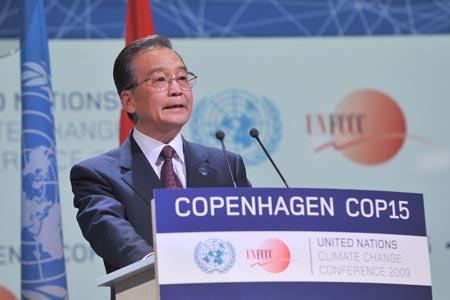Review: Chinese premier's 60 hours in Copenhagen -- Endeavors to build global hope
2009-12-25 08:20 BJTSpecial Report: UN climate change conference in Copenhagen |
BEIJING, Dec. 25 (Xinhua) -- Chinese Premier Wen Jiabao left Beijing for the climate summit in Copenhagen, Denmark on Dec. 16, when pessimism and disappointment were simmering among negotiators, who, after about 10 days' bargaining, found a bridge to span their rift seemed a mission impossible.
"It will be a tough task. Now I can feel how heavy my duty is to attend the meeting on behalf of the Chinese government," Wen told reporters aboard his plane en route to Copenhagen.
 |
| Chinese Premier Wen Jiabao speaks at the leaders' meeting of the United Nations Climate Change Conference in Copenhagen, Denmark, Dec. 18, 2009. (Xinhua/Wu Wei) |
Nevertheless, Wen said he was confident that the talks would bear fruit. "As so many world leaders are gathered there, I believe there should come some achievements," he said. "No matter what the result is, China's action plan will not change, its voluntary reduction target will always be non-negotiable, and its determination in hitting the target will never waver."
WHIRLWIND TALKS WITH WORLD LEADERS
Premier Wen's schedule on Dec. 17 was almost fully occupied by meetings with world leaders.
During the meeting with Danish Prime Minister Lars Lokke Rasmussen, Wen suggested that in order to achieve an outcome for the conference, all parties should stick to the consensus they had reached while leaving differences for future negotiations. "Now it seems to be the only way out. If we can reach a resolution of such a kind, it could well be an achievement of the talks," Wen said.
In his talks with UN Secretary-General Ban Ki-moon, who expressed that a fruitless conference would be unacceptable, Wen proposed to formulate a political document that may reflect the consensus of different parties.

 Mail
Mail Share
Share Print
Print


 Video
Video









 2009 China Central Television. All Rights Reserved
2009 China Central Television. All Rights Reserved